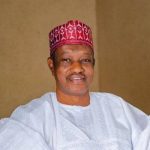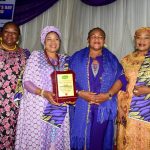Tax burden on Businesses in Nigeria currently one of the highest globally – Oyedele
* Pye Alumni honours 60th ICAN President, GMD First Holdco Plc
Emmanuel Kehinde, Ilorin
The Chairman of the Presidential Fiscal Policy and Tax Reforms Committee, Taiwo Oyedele, has said that currently the tax burden on businesses in Nigeria is one of the highest in the world.
He also opined that Nigeria ranks in the top ten highest corporate tax burden in the world.
He advocated for a change.
He spoke during a grand reception in honour of the 60th (Diamond) President of The Institute of Chartered Accountant of Nigeria (ICAN), Chief Davidson Chijioke Alaribe and the Group Managing Director First Holdco Plc, Adebowale Oyedeji, according to a statement on Wednesday. The reception was organized in Lagos by Student Pye Alumni. The statement explained that Student Pye Alumni (which is class of 1990-1994), has members as fellows of the Institute of Chartered Accountants of Nigeria (ICAN) and Chartered Institute of Bankers of Nigeria (CIBN).
Oyedele, while delivering a keynote address on: “Understanding the Nigeria Tax Reforms,” called for collaborative efforts between government agencies and stakeholders regarding the proposed tax reforms bill, currently before the National Assembly.
He said it is imperative to ensure tax deductions for startup expenses incurred within six years before commencement of business.
He opined that this would foster entrepreneurship and support new businesses.
He said: “We impose a high burden on businesses, large, medium and small. The tax burden on businesses in Nigeria today is one of the highest in the world. Nigeria ranks in the top ten highest corporate tax burden in the world. The same country that needs all the investment that we can get both foreign and domestic.
“We are taxing poverty, we tax capital, we also tax investment. We have a tollgate that we put in front of anything you want to do, we want to collect our taxes in advance whether you make money at the end of the day or not is none of our business.”
“Essentially to be able to facilitate economic growth and also to protect low-income earners, vulnerable groups, small businesses to be exempted, and large businesses to have less burden of tax, including harmonisation of taxes they need to pay. So the conversation was about all stakeholders to rally around, support the bill so that we can use that as a stepping stone towards transforming our economy to something we can all be proud of.”
The event organisers, Students Pye Alumni class of 1990- 1994; congratulated the two honorees and encouraged them to continue embodying the spirit of excellence, perseverance and resilience that defined their time in Students PYE. In attendance were the then directors of the school including: Ayo Adigun; Bunmi Adeoye Esq; Ademola Omolehinwa; Segun Ojo and Joseph Akeju. Also in attendance were the Oba Akarigbo of Remo land, HRH, Oba Babatunde Adwale Ajayi (FCA), Torungbuwa II; who is also an alumni of the school, and the Commissioner for Finance, Abia State, Uwaoma Ukandu; who represented the Governor of Abia State, Alex Otti.
They also urged Micro, Small, and Medium Enterprises (MSMEs) in Nigeria to actively participate in the ongoing tax reform debates nationwide.
They stated that by doing so, MSMEs can reap the benefits of the proposed Tax Bills, which aim to promote economic growth and development, once they are passed into law by the National Assembly.
Alaribe harped on the significance of the proposed tax bill in fostering a culture of tax compliance and expanding Nigeria’s revenue stream.
He also stressed the need for a friendly tax regime, restructuring and reorganisation of tax administration.
He said: “Tax laws, some of them are archaic. This tax reform bill, if passed into law, will try to bring our tax system in line with best practices and also for once, we’ll get it right. I think with what they put in place, if it’s been implemented religiously, it will improve our revenue drive, it will also improve the way we act, it will also improve our consumption pattern and also our tax system will improve and the Nigerian economy will improve.”
Oyedeji concurred that there is the need to reform Nigeria’s tax system.
He said: “The tax to GDP ratio for Nigeria is about 7.1%, for South Africa it’s about 29% and the average for Africa is about 16%. You don’t need a soothsayer to tell you that we need to do something critical about our tax situation. We need a reform and I think the initiative being pursued is a good one.”












